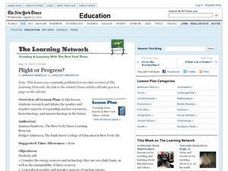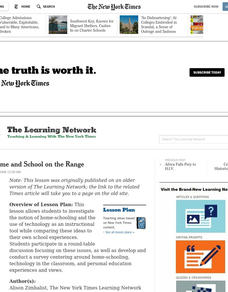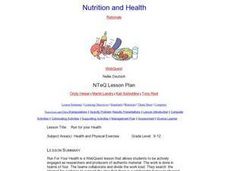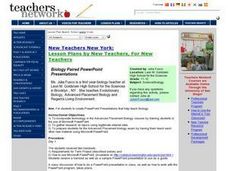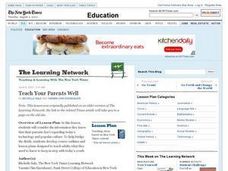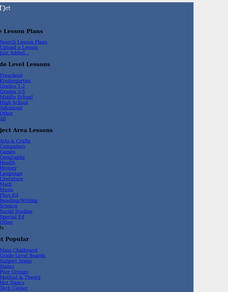Curated OER
Plight or Progress?
Young scholars read an online article to study the positive and negative aspects of nuclear energy, biotechnology, and nanotechnology. They conduct a debate on technology of the future.
Curated OER
The Last Great Race
Third graders identify and discover why the Iditarod race is done each year. They explore the historical significance of the Iditarod. Students also use web sites to research related topics, i.e. diseases (diptheria), geography of...
Curated OER
Both Home And School On The Range
Students investigate the notion of home-schooling and the use of technology as an instructional tool while comparing these ideas to their own school experiences. They develop and conduct a survey centering around home-schooling and...
Curated OER
Run for your Health
Students, in groups, search the Internet for evidence to support the idea about a relationship between physical activities, health and well being. They create a flyer or newsletter for a campaign to recruit students to the runner's club...
Curated OER
Our Robots, Ourselves
Students imagine how they might use a robot in their daily lives, explore advancements in artificial intelligence, investigate robotic technology under development, and prepare posters that show how robotic technology might be...
Curated OER
Local Weather And Location
Students explain how uneven heating of Earth affects wind and water currents. They describe the limits on current technology in predicting weather and how the Water Cycle is related to local weather.
Curated OER
Driving the Digital Highway
Students research a specific type of innovative computer technology in automobiles or other commonplace products or services and create a radio advertisement 'selling' this innovation.
Curated OER
Making the Future Present
Young scholars draw and describe a new system for prison surveillance. After reading an article, they discover the use of a wearable computer by prison guards. In groups, they develop a proposal for a new type of technology to be used...
Curated OER
Appliances with Minds of Their Own
Students examine how everyday appliances might soon possess the capacity "to think" as a result of recent technological advances. A display of their knowledge of this new technology by creating a poster design of a "smart" machine.
Curated OER
Edison and the Light Bulb
Students explore the impact of inventions on society, specifically Edison and the light bulb. In this technology lesson, students use online resources and listen to a story about Edison to develop an understanding of how the light bulb...
Curated OER
Mom, Where Do TV's Come From?
Students explore the history of television using the lifetime achievements of Milton Berle as a springboard for studying social and technological advances in American entertainment. They, in groups, examine the role of television through...
Curated OER
Step by Step
Students analyze the importance of each step, person, and technology involved in the production of goods from raw materials to finished products.
Curated OER
Get Your Motor Runnin'
Young scholars examine the technology of hybrid vehicles and the claims made on their behalf. Upon further exploration, they research and decide which cars, hybrid or non-hybrid, might perform best under various circumstances.
Curated OER
Connecting the Dots
Students consider familiar audio and imaging devices, researching and analyzing the differences between analog and digital versions. They then reflect on which versions of the technology provide a truer record over time.
Curated OER
All Aboard the Innovation Train
Learners read "Next Stop for the Subway, a Fully Automated Future" from The New York Times and consider the effect of technology on their town or city. After discussing arguments for and against the new computer-based subway system in...
Curated OER
Biology Paired PowerPoint Presentations
Young scholars incorporate technology by creating a Microsoft PowerPoint. Students experiment with various animation techniques and slide formats, so that they become familiar with the program. They gather research information on topics...
Curated OER
Teach Your Parents Well
Students compare various aspects of their lives with those of their parents or guardians to find out how they are different, and consider cultural gap between parents and their children by reading and discussing article, "??omg my mom...
Curated OER
The Change of a River
Students explore changes in the Missouri River. In this Missouri River lesson, students discover that changes in the atmosphere cause changes in the river. Students search the Internet for information about the Missouri River and its...
Curated OER
Deep Jungle: New Frontiers
Students watch a series of videos and observe the different plants and animals found in the rainforests. In this ecology lesson, students discuss how technology helped scientists study the jungle. They create 3D maps of Borneo rainforests.
Curated OER
An Ancient Revolution: The Written Word
Students examine the Bible, one of the earliest written sources, as a compilation of narratives, and search the resources on the HERITAGE DVD-ROM for historical "proof" as well as create their own stories and scripts based on ancient...
Curated OER
Weather Words
Students brainstorm and define five terms for precipitation, discuss reasons why English language includes various terms for wet weather, and create word games such as jumbles, word searches, or crossword puzzles with weather terms.
Curated OER
Deadly Stingrays!
Students read a story called Irwin's Death Draws Attention to Stingrays and answer vocabulary and comprehension questions about it. In this stingray lesson plan, student respond to literature by answering questions, recalling details,...
Curated OER
Finding Historical Evidence: David Brion Davis
Students study the Tran-Atlantic Slave Trade and learn to evaluate historical arguments. In this slave trade lesson, students read about the Atlantic Slave System. Students take notes on slave trade and make a timeline for the...
Curated OER
Awesome authors (Elementary, Reading/Writing)
Fifth graders use technology to research and collect data. They develop awareness and appreciation of authors and genres. They organize information for presentation.


